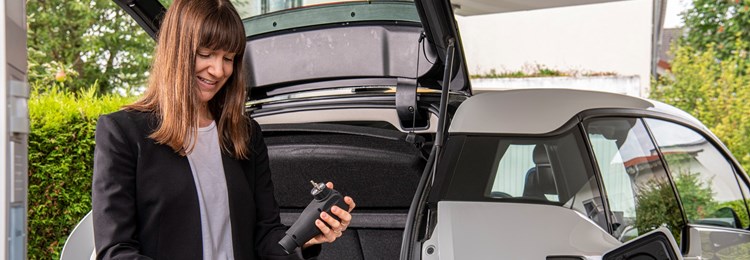
IAA Mobility: climate-friendly solutions for all kinds of mobility – Bosch is generating sales of more than one billion euros with electromobility
Date: Wednesday 08 September 2021
In electromobility, no other company offers as many options as Bosch: from e-bikes to construction machinery, and from silicon carbide chips to pre-integrated e-axle modules. And this is paying off: in electromobility, Bosch is growing twice as fast as the market, and will generate more than 1 billion euros in sales this year. This business is continuing to gain speed: by 2025, sales are expected to grow five-fold.
“Electromobility will become a core business for us, and CO₂-free mobility a growth area. We are turning challenges into opportunities – that’s how we do things at Bosch,” said Dr. Volkmar Denner, chairman of the Bosch board of management, at IAA Mobility 2021 in Munich.
These growth areas also include automated driving. Driver assistance is the basis for all the levels of automated driving. At 40 percent, the market leader Bosch is growing faster than the market in this field as well. The company’s healthy position in the areas of electromobility and automated driving is helping it to successfully hold its own in a market environment marked by the Covid crisis, chip shortages, and the even faster transformation of the mobility sphere: the sales revenue of its Mobility Solutions business sector will grow 10 percent this year. “Bosch is a technology leader, and this means business success,” Denner said.
Electric driving – breakthrough thanks to Bosch high-tech
Electromobility will be the next chapter in the Bosch success story. With upfront investments totaling 5 billion euros so far, and the most efficient electrical powertrain solutions in the market, the company is helping it to a breakthrough. This year alone, upfront investments will come to another 700 million euros. Bosch sees itself as a proactive company that shapes the future. “We are preparing for increasing demand for electric vehicles across the globe. Worldwide, we expect that 60 percent of all newly registered vehicles in 2035 will be electric,” said Dr. Stefan Hartung, member of the board of management and chairman of the Mobility Solutions business sector. In the case of e-bikes, Bosch has been showing for ten years now that innovativeness can create markets. The company’s aim is to shape the mobility of the future, across the entire range. “It must be climate-friendly, but it also has to be affordable and attractive, not least in light of the ambitious targets set by the EU,” Denner added. “Only in this way will people and freight stay mobile in the future as well.” To bring this about, Bosch is continuing to pursue a technology-neutral approach, offering climate-friendly solutions worldwide for all types of mobility, in line with the requirements of national policy. Bosch is investing not only in battery-electric powertrains, but in fuel-cell powertrains as well, and is involved in customer projects in China, the United States, and Europe. The first trucks featuring Bosch technology are already on the road in China.
Bosch technology helps make people’s everyday lives easier. When driving electrically, recharging plays a decisive role. In Munich, Bosch is premiering a new flexible charging cable for electric cars. It features integrated control and safety technology and adapters for Type 2 and household plugs. Even when recharging at a 230-volt power socket, it can do without the otherwise usual in-cable control box, which means that it weighs less than three kilograms – some 40 percent less than conventional charging cables featuring control boxes. And to relieve drivers of the chore of looking for somewhere to recharge on their journeys, the Bosch web-based recharging service gives them access to more than 200,000 charge spots in Europe – including hassle-free payment.
Autonomous driving – Bosch offers everything from a single source
Domain control units, sensors, artificial intelligence: the Bosch portfolio contains all the elements of automated driving, and the company has some 5,000 engineers working on all its levels. Not least among these elements are enhanced assistance functions that allow drivers to take their hands off the wheel. And completely driverless functions are also already possible thanks to Bosch. “With pilot projects in the areas of automated valet parking, Bosch has set standards in Germany and the United States,” Denner said. Bosch is already working with Mercedes-Benz and other partners on deploying this function in the P6 parking garage at Stuttgart airport. The new Mercedes-Benz S-Class is the world’s first production vehicle to feature the technology needed for this. So that driverless vehicles can navigate by smartphone command to a reserved parking bay, Bosch is equipping the parking garage with technology such as fixed-installation video cameras. A further 1,000 parking garages are expected to follow suit by 2025. For all the extra convenience associated with such developments, Bosch sees automated driving above all as something that can make road traffic safer. Bosch pioneered systems ranging from electronic skid control to automatic emergency braking, and continues to pursue the goal of accident-free driving. At the same time, the company is providing innovative software as the basis for the intelligence cars need to have. “Even in the software-dominated mobility of the future, our profound systems expertise will be an advantage: Bosch is equally at home in the world of on-board electronics and of the internet of things, with which cars will be connected,” Denner said.
Connected driving – Bosch thinks beyond the engine hood
As Bosch predicted ten years ago, vehicles are increasingly turning into internet nodes. In the future, software will be just as important as powertrain performance or efficiency. Bosch is actively shaping this change. And the company is well positioned for this: nearly half the R&D associates in the Mobility Solutions busines sector are software engineers. Even the bicycle is becoming part of the internet, as evidenced by the new Bosch eBike Flow app. For example, it enables the software in components to be updated. In addition, software integration is becoming more and more important: here as well, Bosch has the necessary expertise. Take infotainment computers: by 2025, their computing power and software complexity will double. Bosch ensures that the various software modules work reliably with each other. When it comes to connectivity, moreover, the company’s ideas go far beyond vehicles. “Bosch isn’t just about cars, but also knows its way around the factory and home environments. Like no other company, we can connect different domains with each other,” Hartung said. Since April this year, Mercedes-Benz models featuring the MBUX voice assistant have also been a command center for Bosch smart-home applications. From the driver’s seat, a voice command is sufficient to contact the smart home and switch off the lights, open blinds, and control the heating. All this shows that Bosch technology is paving the way to mobility that is sustainable, safe, and exciting.
